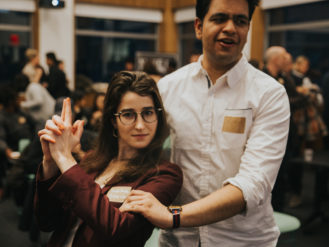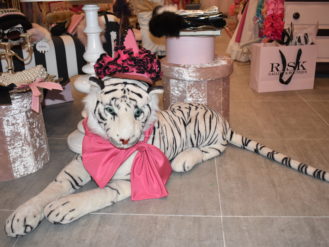A Visit to Greenpoint, Brooklyn’s Thriving Capital of Design
On the eve of the Brooklyn Designs show, we explore how one neighborhood became a hotbed of creativity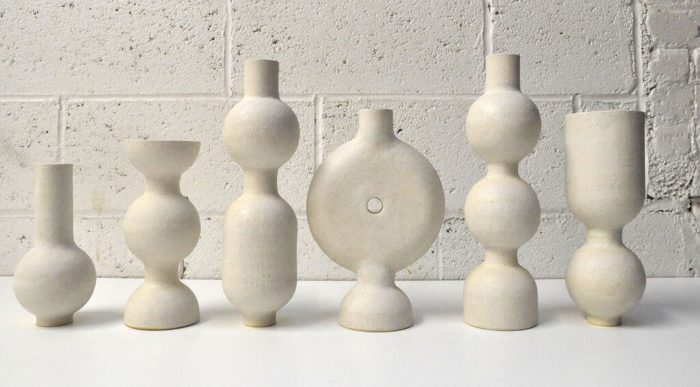
A line of vases called Humble Matter from the shop Greenpoint Hill, which will be exhibiting at Brooklyn Designs on May 11-13 (Photo courtesy of Greenpoint Hill)
What is it about Greenpoint that makes it such an inspiring place for designers? It could be the friendly spirits of more than a century ago, when the neighborhood bustled with craftsmanship. Kim Brown, the owner of Greenpoint Hill, a shop selling sculpture, jewelry and other hand-made objects, is among the entrepreneurs in the area who think the present resonates with the past. “Soon after I found my studio at 100 Freeman St.,” she says, “a friend sent me an article noting that I was right on the edge of what was deemed ‘Greenpoint Pottery Hill’ in the 19th century due to the concentration of porcelain manufacturers in the area.”
Today, a Greenpoint address conveys cachet to the makers of home furnishings, clothing, graphic design, and fine art. Whether it’s the right mix of buildings, the cameraderie, or the history, Greenpoint has reached critical mass as a destination for designers and their customers. “I get inspired every day walking around, even after nine-plus years,” says Mats Christéen, owner of Foundrywood, who makes hand-crafted furniture that combines Brooklyn’s industrial aesthetic with Scandinavian sleekness.
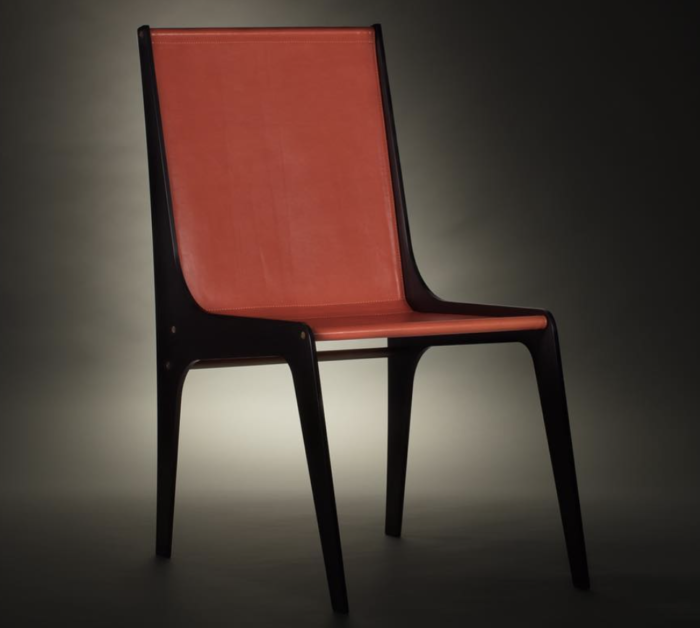
Greenpoint’s Argosy Designs will debut a line of furniture and lighting at Brooklyn Designs
Greenpoint Hill and Foundrywood, along with fellow Greenpoint companies like Argosy Designs and Zieba Knives, will be exhibiting their wares this weekend at Brooklyn Designs, the borough’s annual showcase of furniture, lighting and accessories. The design show, now in its 15th year, will take place for the first time at the Brooklyn Museum. Brooklyn Designs will also be partnering with ICFF, a high-end home-furnishings expo, to present a Brooklyn installation at ICFF’s show May 20-23 at the Javits Center in Manhattan.
Greenpoint’s design hotbed has garnered national recognition. “Williamsburg’s cool older sister has recently reforged its own distinctive retail indentity,” declared Vogue, describing an area hemmed by West, Kent, Noble, and Franklin streets, where home-design shops have flourished. “It’s essentially a mall for the urban set–everything is in one convenient place.”
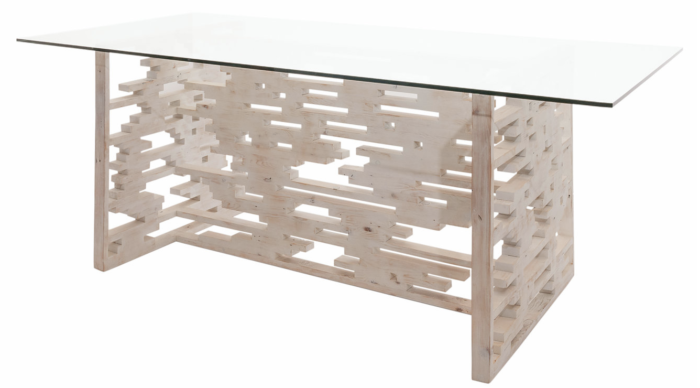
Foundrywood calls this jigsaw-style line of tables the Jenga Collection (Photo courtesy of Foundrywood)
“Greenpoint is like a small village,” says Aelfie Oudghiri, the founder of contemporary home-goods brand Aelfie, which launched as a rug company in 2012 and has since expanded. “There’s a lot of woodworkers, furniture makers and importantly, the space to create. Unlike a lot of other neighborhoods in New York City, there’s a little bit more breathing room.” Aelfie is situated in 61 Greenpoint Ave., a converted former factory for the Eberhard Faber pencil company.
Where Williamsburg has already been baked more or less to completion in terms of increasingly specific and high-end goods, Greenpoint still has a ways to go, with larger spaces at lower rents, more historic districting to prevent over-development, and a family-oriented vibe which makes the home-design shops fit right in. They sit among clothing boutiques and chic bars, health-oriented cafes and the inevitable chain stores. These offerings swirl among the nabe’s older shops, including Polish eateries and bakeries.
But it’s the abundance of converted industrial spaces that has made Greenpoint an attractive place to set up workshops. “Many of the historic buildings that once housed the industrial arts have become the modern studios of local artists and designers,” says Brown, the Greenpoint Hill owner. Greenpoint Manufacturing and Design Center, a nonprofit industrial developer, has rehabilitated seven Brooklyn manufacturing buildings that currently house more than 110 businesses and over 600 employees.
The neighborhood’s growing reputation has begun to attract outposts of international companies as well. MINI, the automaker owned by BMW, converted a 23,000-sq.-ft. former warehouse into A/D/O, a space for designers and startup companies to work. Adidas chose Greenpoint for its Brooklyn Creative Farm, where the company brings designers from all over the world to create its next hot sneakers.
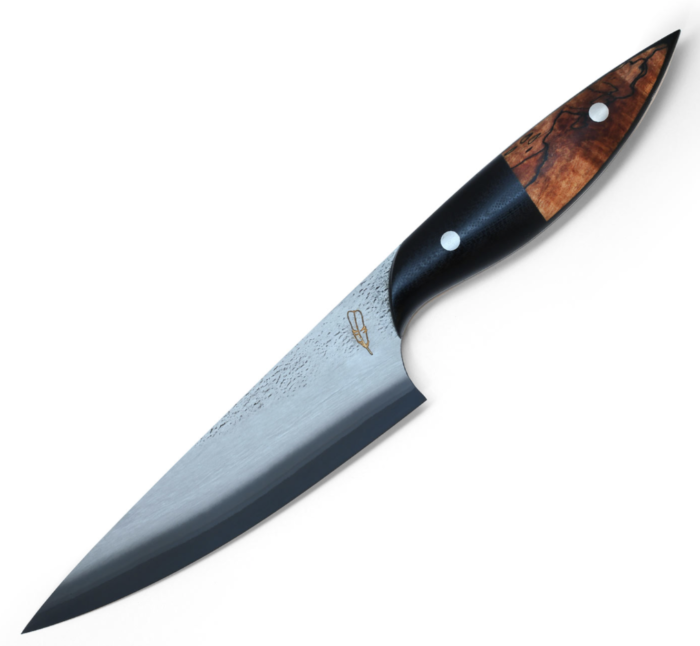
Zieba Knives has won awards for its artful, hand-crafted cutlery (Photo courtesy of Zieba Knives)
The neighborhood has benefited as well by the opening in 2014 of the Brooklyn Expo Center, a cozier, outer-borough answer to the hulking Javits Center. The 60,000-sq.-ft., glassy space, which stands out among Greenpoint’s historic, low-rise blocks, was host to last year’s Brooklyn Designs show, drawing more than 7,000 attendees.
“Greenpoint has the design sensibility of Manhattan in a tight-knit community setting of small and locally owned businesses,” says Kyla Burney, owner of furnishings stores Porter James and Adaptations. Burney opened the two shops within a year of one another and just seven storefronts apart on Franklin Street. “The neighborhood is continually growing at a fast pace,” she remarks, adding that “the diversity is increasing in the area, which is exciting.”
In many ways, Greenpoint’s growth from industrial hub to high-end design center reflects on a micro level the evolution Brooklyn has experienced on a larger scale. The surge of boutiques selling hand-crafted, upscale goods represents a return to the borough’s manufacturing roots, albeit with much smaller batches and a far more well-off clientele.
Readers of The Bridge can buy discount tickets to Brooklyn Designs by entering the code BRIDGE at this website. To hear more about Argosy Designs, you can listen to our podcast with co-founder Erik Johnson here.





